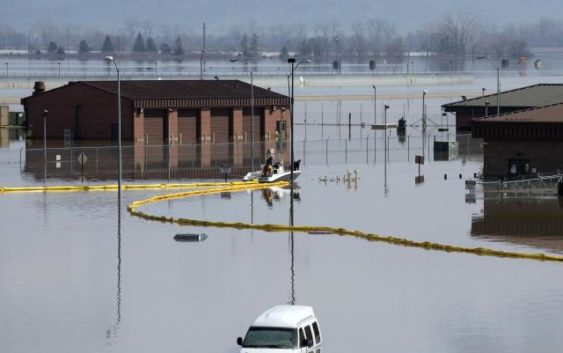- Report: Coastal flooding could threaten 1.4 million homes by midcentury
- Caught on camera | Tornado touches down in Missouri
- Carolina Hurricanes playoff tickets go on sale next week
- Storms kill 6 in the South and Midwest as forecasters warn of catastrophic rains, floods this week
- Weather Impact Alert: Cold front could trigger severe weather in Houston area this weekend | See timeline
Midwest flooding costs increasing, with $1.6B damage in Iowa

DES MOINES, Iowa — Iowa Gov. Kim Reynolds said Friday that recent flooding in the state has caused an estimated $1.6 billion in damage, pushing the total costs from the devastating Midwest flooding to at least $3 billion.
The ongoing flooding along the Missouri River has damaged thousands of homes and inundated vast swaths of agricultural land with water in Nebraska, Iowa and Missouri. The flooding, which followed heavy rains and snowmelt this month, has also been blamed for three deaths.
Reynolds said she sent a letter asking President Donald Trump to quickly issue a disaster declaration for 57 counties in Iowa where businesses, homes and levees have been severely impacted by flooding, including along the Missouri River. More counties may be added to the list.
More than 1,200 homes in Iowa have been destroyed or extensively damaged, while another 23,540 have at least minor damage, she said. Cost estimates indicate the flooding has caused more than $480 million in damage to homes, while businesses have suffered $300 million in damage. Agriculture damage is estimated at $214 million.
Flooding in Nebraska has caused an estimated $1.4 billion in damage. The state received Trump’s federal disaster assistance approval on Thursday.
About 70 miles (112.7 kilometers) of levees in Iowa operated by the U.S. Army Corps of Engineers are damaged or destroyed, and the cost to repair them is estimated at $350 million. About 175 miles (281.6 kilometers) of non-federal agriculture levees also need repair, at an additional cost of $175 million.
“We’re just beginning the season, so this isn’t something we can think about for two years,” Reynolds said. “We need to figure out a way to secure our communities and our farmland and start to repair the agricultural levees and focus on the Corps levees that have been compromised.”
Missouri officials have not yet said how much flooding has likely the cost the state.
The Missouri Department of Transportation said Friday that 120 roads were closed because of flooding, including stretches of Interstate 29 and U.S. 61. The National Weather Service said the Missouri River was expected to crest Friday at levels just short of those reached during historic 1993 flooding in Atchison, Kansas, and St. Joseph, Missouri.
About 1,200 residents of the Kansas town of Elwood were urged to leave, and the governor eased restrictions on large vehicles carrying relief supplies. Across the river, parts of an industrial area in St. Joseph were inundated with water and people were evacuated from a low-lying area.
This year’s flooding is the worst ever at three locations in Nebraska.
National Weather Service hydrologist Kevin Low said during a conference call that the Missouri River reached record levels at Plattsmouth, Nebraska City and Brownville. It crested just short of a record at several other places, including St. Joseph, Missouri, where the river reached 32.02 feet (9.76 meters) on Friday, inches short of the record of 32.07 feet (9.77 meters) set during the historic 1993 flood.
About 3,000 people in a low-lying area in and just outside of St. Joseph were evacuated Friday as a precaution, but Buchanan County Emergency Management Director Bill Brinton said the levee was holding strong.
“We do feel pretty confident we’ll make it through this,” Brinton said.
Crests are still coming farther south and east on the Missouri River, but flooding in Kansas City and other points in Missouri isn’t expected to be nearly as severe.
___
Associated Press reporters Heather Hollingsworth in Kansas City, Missouri, and Jim Salter in St. Louis contributed to this report.